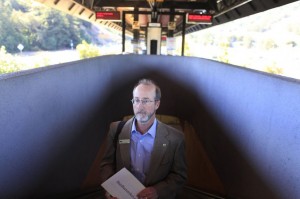While Los Angeles transportation leaders just unveiled a $120 billion plan for the November ballot, BART leaders in the Bay Area are similarly hoping for electoral gold with a bond measure for the same election. BART is in a state of rapid decay and would use the bond funds primarily to do long-neglected maintenance.
But union politics may hinder the chance to get a two-thirds voter supermajority on the measure. After the crippling 2013 BART strikes brought the region to a halt, then-suburban Orinda city council member and Democrat Steve Glazer was the only elected official willing to speak out against the powerful public sector unions backing the strike.
Ruling Democrats fled from Glazer en masse, but he rode East Bay suburban frustration with BART all the way to the State Senate in a special election in 2015, with strong support from the business community and Republicans.
Glazer has held firm to his anti-BART union stance, even holding up comprehensive state transportation reforms unless he gets concessions on BART labor policies. And recently he threatened to withhold support for the BART bond unless the agency undertakes labor reforms.
But he may now be alienating his big business backers in the Bay Area, who’d rather see the BART bond pass to get their workforce reliably from the suburbs to employment in the city — even if it means passing an opportunity to get concessions on labor practices. The business group Bay Area Council came out strongly against Glazer’s position in a recent newsletter:
The Council wholeheartedly agrees that BART needs to do a much better job of managing costs, but strongly disagrees that risking the success of a measure designed to ensure the safety and reliability of an aging system serving 440,000 riders every day is the responsible approach. The Council was on the front lines three years ago opposing BART strikes and advocating for prioritizing the system’s desperate infrastructure needs. Addressing BART’s labor agreement should be handled separately when it expires in 2017. As the BART Board of Directors eyes a decision in the coming months on whether to move ahead with the ballot measure, the Council is urging Sen. Glazer and other elected leaders to support a measure that puts the system’s future safety and reliability first.
It’s a rare break with the business-friendly Glazer — and a sign of how tight the electoral margin is likely to be in November for BART.
But Glazer is desperate to use whatever leverage he has. Given the role public sector unions play in supporting Democratic politicians in the Bay Area and statewide, he’s on the wrong side of a lopsided battle.
About Ethan Elkind
Leave a Reply Cancel reply
You must be logged in to post a comment.



